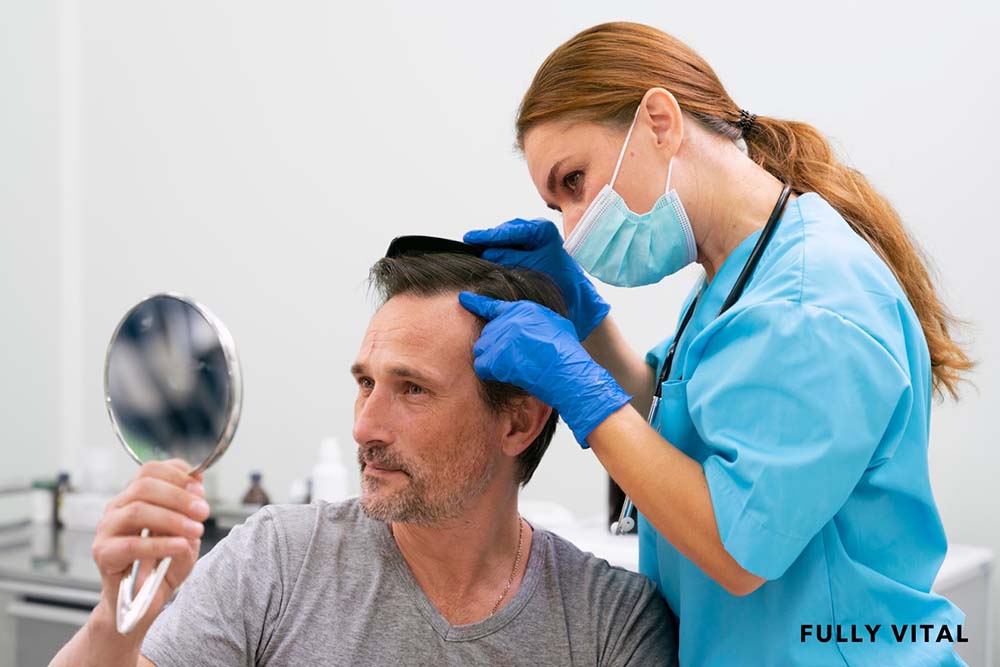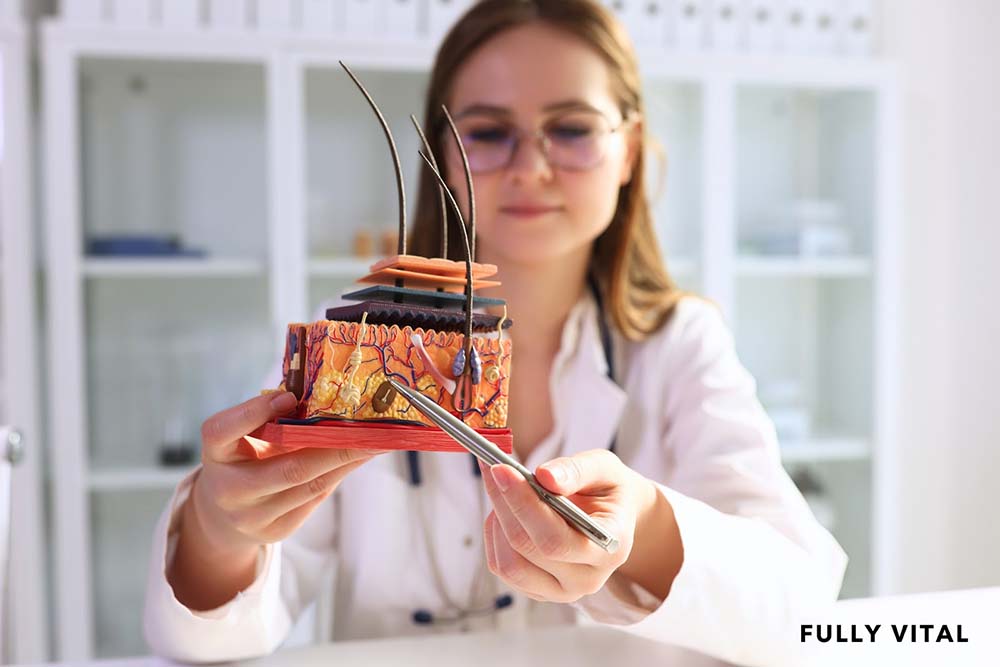
Dermatology: Understanding the Key to Healthy Hair Growth
As women of all hair types seeking to stimulate hair growth, you may have come across the term "dermatology" in your quest for effective solutions.
In this article, we will delve into the world of dermatology, exploring its importance, how it works, its benefits, potential downsides, and alternative options.
So, let's get started!

I LOVE MY HAIR NOW
FullyVital hair serum and hair vitamins made tremendous improvements in my hair. I truly love my hair now.
Dorit S.,
What Is Dermatology?
Dermatology is the branch of medicine that deals with the diagnosis and treatment of skin and hair-related conditions.1
It focuses on the health and well-being of the largest organ in our body – the skin – and its appendages, including hair and nails.
Dermatologists are specialized medical professionals who are experts in diagnosing and treating a wide range of hair and skin issues.2

Why Is Dermatology Important?
Dermatology plays a pivotal role in our overall health and well-being, and its importance extends beyond merely addressing skin and hair concerns.3
As women of all hair types looking to stimulate hair growth, understanding the significance of dermatology can help you make informed decisions about your hair care and overall health.
Here are several reasons why dermatology is crucial:
Comprehensive Skin and Hair Care
Dermatology offers comprehensive care for your skin and hair.
Whether you are struggling with acne, eczema, hair thinning, or any other condition, a dermatologist can provide specialized treatments tailored to your unique needs.
They don't just treat the symptoms but focus on identifying the root causes to offer effective and long-lasting solutions.
Early Detection of Skin Cancer
Skin cancer is a serious health concern, but when detected early, it is highly treatable.
Regular visits to a dermatologist for skin examinations allow for the timely identification of suspicious moles, growths, or changes in the skin, which can be a critical step in preventing the progression of skin cancer.
How Does Dermatology Work?
When you visit a dermatologist for hair growth concerns, they will conduct a comprehensive assessment of your scalp and hair condition.
This may involve close examination, medical history evaluation, and sometimes, diagnostic tests.
Based on their findings, they will recommend suitable treatments, which may include topical solutions, oral medications, laser therapy, or other advanced procedures.
The personalized approach ensures that you receive the best possible care for your hair needs.
What Are The Benefits Of Dermatology?
The benefits of consulting a dermatologist for hair growth are numerous.
Some of the key advantages include:
Expert Diagnosis
Dermatologists are highly trained professionals with in-depth knowledge of hair and scalp conditions, enabling them to pinpoint the root cause of your hair growth issues.
Personalized Treatment
A dermatologist tailors treatment plans to suit your specific hair type and concerns, ensuring maximum effectiveness.
Access to Advanced Procedures
Dermatology offers access to cutting-edge treatments, such as PRP (Platelet-Rich Plasma) therapy and hair transplant surgery, providing viable options for hair restoration.
Long-Term Hair Health
By addressing underlying issues, dermatology promotes long-term hair health and minimizes the risk of recurring problems.
Are There Any Downsides To Dermatology?
While dermatology offers a wealth of benefits, it's essential to be aware of potential downsides.
Some considerations include:
-
Cost: Dermatological treatments may involve certain costs, depending on the complexity of the procedure and your healthcare coverage.
-
Time and Patience: Achieving optimal results may require multiple sessions and consistent adherence to the treatment plan, which demands patience and dedication.
-
Individual Responses: Everyone's body is unique, and individual responses to treatments may vary. It's essential to manage expectations and work closely with your dermatologist to find the most effective approach for you.
What Are The Alternatives To Dermatology?
If you are exploring alternatives to dermatology for stimulating hair growth, several options are worth considering:
-
Natural Remedies: Some individuals opt for natural remedies, such as essential oils (e.g., rosemary oil, peppermint oil) and herbal supplements, to promote hair growth.
-
Over-the-Counter Products: There are various over-the-counter hair growth products, including shampoos, conditioners, and serums, which may offer some benefits.
-
Lifestyle Changes: Adopting a healthy lifestyle, including a balanced diet, regular exercise, and stress management, can positively impact hair health.
-
Cosmetic Hair Solutions: Certain haircare products and treatments, like volumizing shampoos or hair extensions, can enhance the appearance of your hair.
What Does A Dermatologist Do To Your Face?
When you visit a dermatologist for concerns related to your face, they can provide a range of specialized treatments and solutions to improve your skin's health and appearance.
Here are some common procedures and services dermatologists offer for your face:
-
Acne Treatment:
Dermatologists can assess and treat various forms of acne, providing personalized solutions to manage breakouts and prevent scarring.
-
Skin Examinations:
Regular skin examinations help dermatologists detect early signs of skin cancer and other skin conditions, enabling timely intervention.
-
Chemical Peels:
Chemical peels involve applying a solution to exfoliate the skin, helping to reduce fine lines, improve skin tone, and treat mild scarring.
-
Botox and Dermal Fillers:
Dermatologists offer cosmetic injectables like Botox and dermal fillers to reduce wrinkles and restore facial volume.
-
Laser and Light Therapies:
These non-invasive treatments can target various skin concerns, including pigmentation, redness, and uneven texture.
What Are Examples Of Dermatology?
Dermatology encompasses a wide range of conditions and treatments related to skin, hair, and nails. Some common examples of dermatology include:
-
Acne Vulgaris: A skin condition characterized by pimples, blackheads, and whiteheads.
-
Eczema (Atopic Dermatitis): A chronic inflammatory skin condition causing itching and rashes.
-
Psoriasis: An autoimmune disorder that leads to rapid skin cell growth, resulting in scaly patches.
-
Rosacea: A chronic skin condition causing redness, flushing, and visible blood vessels on the face.
-
Hair Loss (Alopecia): The loss of hair from the scalp or other parts of the body.
What Are The 4 Types Of Dermatology?
Dermatology is a diverse field with various specialized areas.
The four main types of dermatology are:
Medical Dermatology
Focuses on the diagnosis and treatment of skin conditions like acne, eczema, psoriasis, and skin cancer.
Surgical Dermatology
Involves surgical procedures to remove skin cancers, moles, cysts, and other skin growths.
Cosmetic Dermatology
Concentrates on enhancing the appearance of the skin through procedures like Botox, dermal fillers, and chemical peels.
Pediatric Dermatology
Deals with skin conditions affecting infants, children, and teenagers.
Should I See A Dermatologist For Itchy Skin?
If you experience persistent and bothersome itching of the skin, it's essential to consider consulting a dermatologist.
They can help identify the underlying cause of your itchy skin and recommend appropriate treatments, which may include:
-
Topical medications to reduce inflammation and itching.
-
Allergy testing to identify potential triggers.
-
Lifestyle changes to avoid irritants or allergens.
-
Moisturizers and skincare routines to improve skin barrier function.
Can A Dermatologist Fix Dry Scalp?
Yes, a dermatologist can address the issue of dry scalp and help restore your scalp's health.
They may recommend the following:
-
Medicated Shampoos: Prescription or over-the-counter shampoos designed to hydrate the scalp and relieve dryness.
-
Scalp Treatments: Dermatologists may suggest specific treatments, such as scalp massages or oils, to nourish and moisturize the scalp.
-
Identifying Underlying Causes: Dry scalp may be a symptom of an underlying condition that a dermatologist can diagnose and treat.
-
Lifestyle Modifications: Making changes to your hair care routine and avoiding harsh products can help improve scalp health.
Experience Youthful Hair with Fully Vital!Unlock the secrets to age-defying hair with Fully Vital's powerful, science-backed hair growth products. Key Features:
Benefits:
Join the Fully Vital community today and embark on a journey to beautiful and age-defying hair! |
Final Thoughts On Dermatology
Understanding dermatology's significance is key to achieving healthy and vibrant hair.
As women of all hair types seeking to stimulate hair growth, we have explored the vital role dermatology plays in diagnosing and treating various hair and scalp conditions.
Dermatologists offer personalized solutions that go beyond addressing symptoms, focusing on identifying root causes for long-lasting results.
By consulting a dermatologist, you can benefit from expert guidance, advanced treatments, and a comprehensive approach to hair health.
Remember, early detection of potential issues, such as skin cancer, is crucial for overall well-being.
Dermatology empowers you to take proactive steps toward preserving the health and beauty of your skin and hair.
At Fully Vital, we are committed to helping you foster a healthier relationship with your locks.
Our variety of hair growth products is designed to combat aging and promote strong, luscious hair.
Embrace the power of dermatology and take the first step towards a more confident and radiant you.
Frequently Asked Questions About Dermatology
Is dermatology treatment painful?
Dermatology treatments are generally well-tolerated, but some procedures may cause mild discomfort.
Your dermatologist will inform you about what to expect during each treatment.
Are dermatology treatments suitable for all hair types?
Yes, dermatological treatments can be tailored to suit different hair types and conditions, making them effective for a wide range of individuals.
Can dermatology help with hereditary hair loss?
Yes, dermatologists can offer treatment options to manage hereditary hair loss and slow down its progression.
How soon can I expect results from dermatological treatments?
The timeline for results varies depending on the treatment chosen and individual response.
Some may see improvements within weeks, while others may take a few months.
Are there any side effects of dermatology treatments?
While side effects are typically minimal and temporary, your dermatologist will discuss potential risks associated with specific treatments during your consultation.
How do dermatologists diagnose hair loss?
Dermatologists employ a systematic approach to diagnose hair loss (alopecia) and identify its underlying cause.
During your appointment, they may:
-
Medical History: Your dermatologist will inquire about your medical history, family history of hair loss, and any recent life changes or stressors.
-
Physical Examination: A thorough examination of your scalp and hair follicles helps identify patterns of hair loss and potential scalp issues.
-
Pull Test: This simple test involves gently tugging on a small amount of hair to determine the amount of hair shedding.
-
Scalp Biopsy: In some cases, a small skin sample may be taken for microscopic examination to aid in diagnosis.
-
Blood Tests: Blood tests can help identify any nutritional deficiencies or hormonal imbalances contributing to hair loss.
Do dermatologists deal with hair breakage?
Yes, dermatologists can address hair breakage and provide guidance on how to prevent further damage.
Hair breakage is often caused by factors such as excessive heat styling, chemical treatments, or rough handling.
Your dermatologist may recommend:
-
Gentle Haircare: Using mild shampoos, conditioners, and avoiding harsh styling practices can help minimize hair breakage.
-
Trimming: Regular hair trims can remove split ends and prevent breakage from traveling up the hair shaft.
-
Haircare Products: Dermatologists can recommend products with nourishing ingredients to strengthen and protect your hair.
What should I expect during a dermatology appointment?
During your dermatology appointment, you can anticipate the following:
-
Consultation: Your dermatologist will discuss your hair and scalp concerns, medical history, and lifestyle factors.
-
Examination: A thorough examination of your scalp, hair, and any specific areas of concern will be conducted.
-
Diagnosis and Treatment Plan: Based on the findings, your dermatologist will provide a diagnosis and create a personalized treatment plan.
-
Discussion of Options: Your dermatologist will explain the recommended treatments, their potential benefits, and any associated risks.
-
Opportunity for Questions: You can ask any questions or seek clarification on the proposed treatment plan.
How often should i see a dermatologist?
The frequency of dermatology visits depends on your specific hair and scalp concerns.
For general hair health and routine maintenance, an annual visit may be sufficient. However, if you are experiencing persistent hair loss, scalp issues, or other concerns, your dermatologist may recommend more frequent visits initially.
What is hair loss called in dermatology?
In dermatology, hair loss is commonly referred to as "alopecia." There are various types of alopecia, including:
-
Androgenetic Alopecia: Commonly known as male or female pattern baldness, this is the most prevalent form of hair loss.
-
Alopecia Areata: An autoimmune condition causing patchy hair loss on the scalp or body.
-
Telogen Effluvium: Temporary hair shedding triggered by significant physical or emotional stress.
-
Scarring Alopecia: Hair loss characterized by permanent damage to hair follicles and subsequent scarring.
Sources:
-
American Academy of Dermatology Association. (2020). What is a dermatologist? Aad.org. https://www.aad.org/public/fad/what-is-a-derm
-
Skin Care Doctors. (2021, October 13). Cleveland Clinic. https://my.clevelandclinic.org/health/articles/12165-dermatologists-skin-care-doctors
-
American Academy of Dermatology Association. (2020). What is a dermatologist? Aad.org. https://www.aad.org/public/fad/what-is-a-derm







